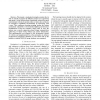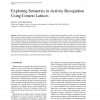432 search results - page 17 / 87 » Out of context: Computer systems that adapt to, and learn fr... |
IROS
2008
IEEE
14 years 2 months ago
2008
IEEE
— We present a topological navigation system that is able to visually recognize the different rooms of an apartment and guide a robot between them. Specifically tailored for sma...
JAISE
2010
13 years 2 months ago
2010
Studying human activities has significant implication in human beneficial applications such as personal healthcare. This research has been facilitated by the development of sensor ...
PERCOM
2004
ACM
14 years 7 months ago
2004
ACM
A course on pervasive computing should be structured around key functions throughout a systems development process to cover common underlying concerns throughout science and engin...
IPPS
1999
IEEE
13 years 12 months ago
1999
IEEE
The rapid progress in high-performance microprocessor design has made it di cult to adapt real-time scheduling results to new models of microprocessor hardware, thus leaving an un...
ACL
1997
13 years 9 months ago
1997
Although adequate models of human language for syntactic analysis and semantic interpretation are of at least contextfree complexity, for applications such as speech processing in...


